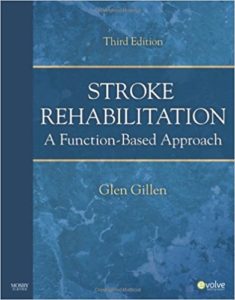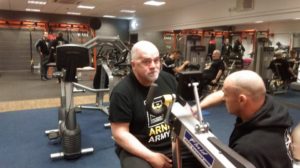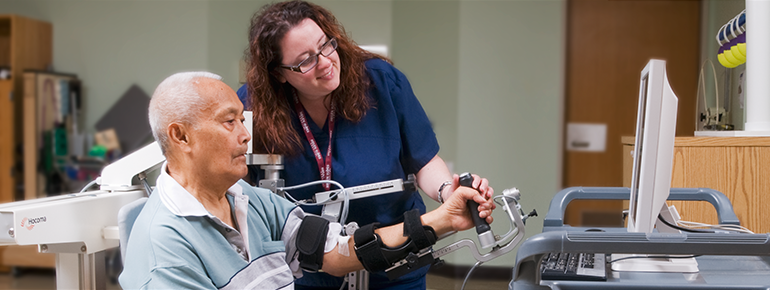Many years of research suggests that the mobility and functional dependence of stroke survivors worsen over time and that accessing later rehabilitation becomes increasingly difficult for stroke survivors. This raises the big question: when should your ‘supported care pathway’ end? The ideal answer is ‘when I am better’.
The problem is that stroke survivors rarely simply ‘get better’ or ‘get back to normal’. Clinical rehabilitation therefore always has to be a compromise, due to time and resources allocated to professionals and patients. Just ask any hard-working physio or OT! And there are also some specific factors (Approach-specific factors, for example) involved in this compromise which will probably never be fully explained to your satisfaction, even if you were to ask.
 Stroke survivors simply tend to know when therapy seems to have ended too soon. They can feel very neglected. Let’s quickly examine Professor Glen Gillen’s handbook ‘Stroke Rehabilitation: A Function-Based Approach’ (a must-get’ read).
Stroke survivors simply tend to know when therapy seems to have ended too soon. They can feel very neglected. Let’s quickly examine Professor Glen Gillen’s handbook ‘Stroke Rehabilitation: A Function-Based Approach’ (a must-get’ read).
In it is an inspirational account from his colleague, the late Professor Barbara Neuhaus (Director of Columbia University’s Programs in Occupational Therapy) who had a stroke in later life and wrote an inspirational description of her resilience and fighting back against her new limitations.
When she got back home from the hospital, different therapists came to her house and assessed her. All three independently signed off that she was too advanced to receive home therapy and so she lost eligibility for further therapy because she was too ‘well’.
Yet instead of feeling elated that these three professionals had all independently agreed she was well, she just felt abandoned and let-down and certainly felt that her rehab was very far indeed from complete.
I’m not sure this squares with US clinical practice guidelines concerning management of adult stroke rehabilitation care:
‘Patients who have sustained an acute stroke should receive rehabilitation services if their post-stroke functional status is below their pre-stroke status, and if there is a potential for improvement. If pre-and post-stroke functional status is equivalent, or if the prognosis is judged to be poor, rehabilitation services may not be appropriate for the patient at the present time’.
Is it that this community therapy failed to recognise the requirement for further rehabilitation, was there no money or time to help her further or was what they felt they could do for her in itself limited at the time? I don’t know. Interesting to speculate though.
Back here in the the UK, we know that many people, after discharge from community physio are clearly not ‘well-enough’ not to need further assistance. They may still be stuck in wheelchairs and/or using sticks and orthotics without much of an idea of how to proceed (ie, self-manage, self-rehab, diminish the use of functional aids over time etc) when the care pathway (from the hospital and community teams) has finished.
But really, it has to be said that the NHS has 99 times out of 100 (or so!) done their very best for them, with usually outstanding pathway – from critical life-saving care all the way to other leading-edge follow-up services such as Prof Nick Ward’s Upper Limb Clinic, which I hope will be used as a blueprint for similar services in hospitals around the UK.

But here’s the thing. Community therapy obviously should phase into a much, much longer, joined-up and structured period of support. And I think all involved in stroke care would agree with me. But it can’t. The questions to be asked are then: who can help, and who will pay for it. Big questions.
A partial answer to the first may possibly be to activate a rung of professional therapists and exercise trainers to support the hospitals in the way that ARNI has done for years. The answer to the second is unclear and outside the remit of this blog!
Back to ‘what happens after therapy’. There is an interesting review of a workshop carried out by the Care Quality Commission (CQC) that I accessed way back in in 2009 that examines services for people who have had a stroke and their carers. The conclusions from the workshop echo the same stories we are told at ARNI every day. Some of the people involved were even our past patients and carers.
The report includes the comment which I get nearly every day on the phone from stroke survivors and carers as a way to precede asking for help. Quoting from the CQC document: “…often people have been given very negative prognoses. They write you off totally, giving you no hope.” It’s important to acknowledge that once YOU BELIEVE that someone who you view as representing the medical profession has told you this, there’s not much you can do to undo having been told it! It’s the way you respond to it that counts.
My view about this for many years is that often people won’t actually have been told ‘you’ll never move this limb again’, or similar, but it’s what they’ve come to understand as the sum result of the ‘it’s not ethical not give my patient false hope’ thing.
It’s actually the only way possible to proceed clinically, but the net result is people either simply giving up before they start, or go the opposite direction and going at their rehab with renewed vigour ‘to spite’ the consultant/physio or whoever they have labelled as the naysayer! I can’t tell you how many times I’ve heard this with stroke survivors who train with me. Personally, I’m not sure it’s helpful to give little hope to people – I hear this less and less now, thank goodness.
Back to a few more of the issues raised in this 2009 workshop. The people involved discussed how the physiotherapy they had received had been very good and said the physiotherapists had really cared for them. One participant mentioned how the physiotherapists had helped him get out of the house which was really important to his recovery (turning point) and commented that he still keeps in touch with them. The group discussed, however, that therapists are under a lot of pressure and some commented that their physiotherapy service had been cut-off after a certain period of time.
One stroke survivor felt that whilst in his experience the physiotherapy was very good in hospital, the physiotherapists never explained the purpose of the exercises they were given and how they would help. Another participant highlighted the importance of physiotherapists explaining the reason and importance of carrying out exercises. Some people talked about finding further help merely ‘by chance’, and said that they needed help navigating ‘the system’.
Another stroke survivor described how when he had a stroke he was declared medically unfit for work, ‘thrown out’; and had nowhere to turn. He went to the Citizens Advice Bureau but they did not have the expertise. On the medical side, he was simply sent home with no support or back up. He was told he would make a full recovery and had his benefits taken away. He said it was not until two years after his stroke that he was referred to the Stroke Association for informational help. Another stated that independent services are bewildering and it is very difficult to see what you might be able to get to fulfil your needs and help you live. He expressed the view that the voluntary sector is often better than state care services in this regard.
A carer said that the intensive physiotherapy received in hospital was not followed up after discharge, and that they had to wait several weeks after going home for home-based physiotherapy to start. She added that physio (once a week for 6 weeks) was not adequate and that, although instruction sheets were given for practising between sessions, there was no ongoing support after that time. As a result she paid for private therapy.
But then maybe services in general have improved across the board in the 10 years since this CQC Report.
So, what do you think? Does community therapy end too quickly? And what can community services do better to support physical rehab? Also, what does usual clinical care tend not to concentrate on enough for individuals before discharge?




5 Comments
In early 2017 I decided I should take more exercise and started going to my local swimming pool and built up to a point where I was regularly swimming 32 lengths of the pool. on the last occasion I was there, mid march 2017I heard a voice above me asking if I was having trouble climbing out as I was turning round. the lifeguard had obviously spotted something was wrong and the next thing I knew was that he had 2 ambulance men standing beside him. I woke in my stroke unit at Eastbourne dgh and was there for a few months before being handed on to the Irvine Unit in Hastings – a specialoist stroke rehab unit where I I hadseveral months of treatment. – it got to a point where I was regularly hobbling down to the physio and exercise roomonlky to be turned away told that the physios were too busy to see me andmy presence invaded other peatients’privacy so I took to walking out of the unit and round and round the outside. I still feel that I needed far more support at that stageand if I’d been shown the GRASP system back then would not have had to cope with no use of my left arm for as long as I have had to. after I was discharged I eventually met up with the People at Avanti(abi), an acquired brain injury unit in st Leonards who have been a great support though I do still feel that I needed much more Physio in thhe early days
My Mother Jill had a severe stroke aged 73, 5 years ago. The first irony in hospital was that if you didnt improve (eg plateau) with hospital physio, then you were dischargable from hospital. Just as she was about to be discharged, I got her to try hard and she was eligible for more physio in hospital.
I was fearful of the lessened physio after hospital and arranged (£50 hour)private sessions. I had been under impression that neuroplasticity needed to be worked on immediately, in first 6 months,up to 2 years. Over the 5 years Mini strokes and seizures have reduced her ability to walk with a frame .
Since a year ago, she became total hoist and wheelchair bound, so she has been moved into a nursing home.
I am grateful to the home, as it has a staff physio, assisting Jill 5 to 10 mins a day, 5 days a week. The aim is to stand with a rota stand rather than use hoist during personal care. Jill is fearful and it exhausts her, but she remains positive that she will improve.
5 years after stroke she’s still hopeful, still trying and there is still the possibility of improving.
A brilliant write up, Tom, and I can agree that when the physio leaves there is nothing there but you! When my physio was here for the last time she asked me what I would like to do now. I answered that I should like to start Art, as I had done some in The Wolfson along with so many other things, which she said she liked, and then I asked her what she thought about me doing Pilates? She looked at me and said “Oh I don’t think you will be able to do that”. Well I thought, just you wait! I went down to the day/evening classes and put my name down for both – and I’ve been doing Pilates twice a week ever since!
The doctors also said the same sort of thing – I had stayed on the floor in the kitchen for 28hours before I was found. On top of that I had to go through Richmond Park to the hospital, through accident & emergency and into a bed before I woke up. When I did, my daughter said something, I replied and she couldn’t understand a word I said! She told me this a couple of months later. In addition I broke my arm whilst having my Stroke, on the kitchen floor, and they didn’t even know about it – I found out when I fell 18 months later and the radiographer told me. The doctors expected me to finish up in a wheelchair, with only a slight chance of me talking! Needless to say I’ve done so much better than anyone expected, but again it’s only due to my doggedness!
Its been 14 years since I had my Stroke, at 54, but I’m still getting better every year!
I WOULD SUGGEST COMMUNITY SERVICES WORK TOGETHER WITH ARNI TO HELP IMPROVE THERAPY AND SUPPORT THE SURVIVOR. CLINICAL CARE TENDS TO CONCENTRATE ON WHAT THEY THINK THE SURVIVOR NEEDS, AND NOT WHAT THEY THINK THEY WANT, THE SURVIVOR NEEDS TO BE INVOLVED WITH THEIR REHABILITATION AND WANT TO PUSH THE CLINICAL CARE BOUNDARIES.
A GREAT WRITE UP TOM, AND I WOULD AGREE WITH YOU STROKE RECOVERY IS LONG TERM AND NOT JUST POSSIBLE TO GET EVERYTHING BACK IN 6 WEEKS.
I WAS LUCKY ENOUGH TO ATTEND A NEURO REHAB CENTRE IN OXFORD FOR 10 WEEKS, HAD I BEEN RELIANT ON JUST AN HOUR A WEEK IN COMMUNITY CARE WITH CARERS CARRYING OUT EXERCISES GIVEN TO THEM BY THE COMMUNITY PHYSIO I WOULD NOT BE WHERE I AM, THAT AND BEING BLOODY MINDED, DRIVEN, DETERMINED!